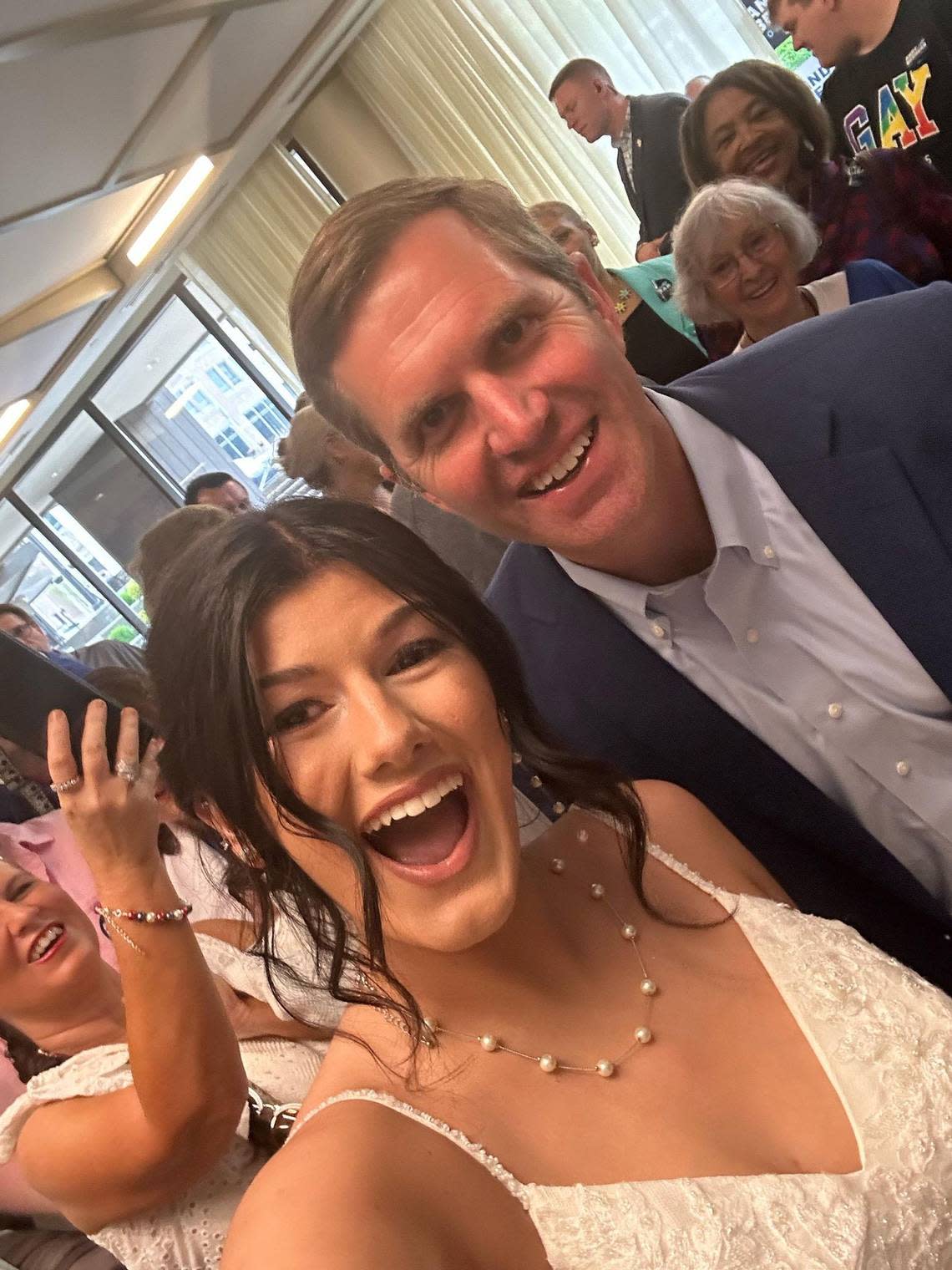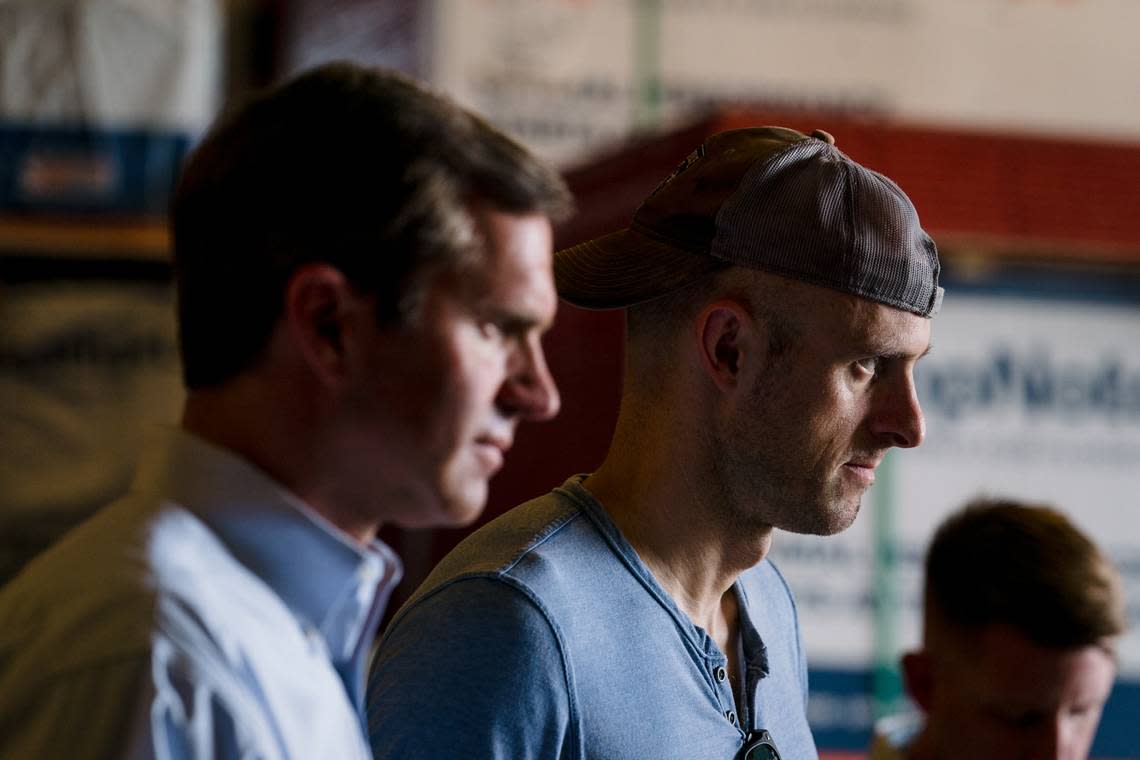‘Cameron should be ashamed’ of ‘gross, disgusting’ campaign, says Beshear’s top strategist
For Eric Hyers, the bride was the omen.
The week after Kentucky’s Republican gubernatorial primary in May, Gov. Andy Beshear had started his bus tour at an Ashland hotel.
Amid a bustling crowd of people, a woman in her wedding dress, just an hour away from her wedding, rushed down to the second floor and made her way straight to the governor for a selfie.

“That kind of energy, that kind of enthusiasm, you just cannot fake it,” said Hyers, Beshear’s campaign manager in 2019 and 2023. “The best advance team in the world cannot create an electrical enthusiasm — it either exists or it does not.”
The bride was the sign for Hyers that even in a deep red state, rife with economic anxiety, culture wars and a deeply unpopular national Democratic president, Beshear could win again.
The plan shaped by Hyers and Beshear depended on a solid record, authenticity and a relationship between a candidate and voters forged through tornadoes, floodwaters, and many, many selfies.
Of course, with the best anecdotes there are always the cold, hard facts.
The bride, Delaney Blackwell, was indeed excited to have a selfie with the governor on her wedding day. Unfortunately, Delaney Blackwell could not vote for Beshear because she lives across the river in Ohio.
“I’m not a Kentucky voter, but, yeah, I think the governor is pretty cool,” Blackwell said last month. Her pastor had to cancel, so she asked Beshear to officiate. He was busy, he told her.
“He was cool and pretty funny,” she said.
When I asked her what she thought of Beshear’s opponent, Attorney General Daniel Cameron, her response was also telling.
“Who is it?” she asked. “I’ve never really heard of him.”
Political campaigns are a strange alchemy of mind-boggling data collection, door-knocking, strategy, money and luck. Beshear had money, and as the Republican primary got uglier and uglier, the Beshear campaign collected more money (in late October, he had a $19 million war chest) and assembled more than 100 field organizers and hundreds more volunteers.
Hyers, 39, agreed to sit down to a Herald-Leader interview the day after the election. The topic: How did Beshear win and how did a popular Democrat knock off a Republican attorney general who touted the endorsement of former President Donald Trump in a GOP-leaning state.
He pointed to three big strategic decisions that shaped the whole campaign in Beshear’s favor. It was a plan that gained energy by mistakes made by the Cameron campaign, which based much of its messaging on trans attacks and strangely misguided ads about Beshear, like calling him “crazy.”
Hyers did not hold back on his opinion of Cameron’s operation. The Cameron team did not respond to a request for comment.
“I think Daniel Cameron should be ashamed and embarrassed by the race he ran and so should his team,” Hyers said on Wednesday morning after just a few hours of sleep.
“It was gross, disgusting, and just very, very craven, and I’m glad they lost and it wasn’t that close. They deserve to be embarrassed. They deserve to be made an example of of how you lose with a Republican in a red state.”
Running on a record
Hyers is something of a specialist in governor’s races, a Democrat-in-a-red-state-whisperer, having managed Rhode Island Gov. Gina Raimondo’s 2014 campaign and Montana Gov. Steve Bullock’s reelection in 2016, the same year Trump won the state by 20 points.
The first big strategic decision by the Beshear team was to wait until after the May primary to launch ads. They wanted to open with a big, positive message focused on Beshear’s record that would bring a new tone to a race from a primary in which the two top candidates went low and dirty against each other.
The Thursday after the primary, they released “Four Years,” a 60-second spot that showed Beshear walking through tornado wreckage in Mayfield and flooding in Eastern Kentucky, reminding voters of their shared values in the midst of disaster.
“We knew whoever won (the GOP primary) would emerge mostly broke,” Hyers said. “We’ve won primaries before and emerged very broke. We wanted to make it hurt as much as possible.”
On the other hand, political action committees supporting Cameron kicked off the pro-Cameron television campaign with ads about transgender children and Beshear’s veto of Senate Bill 150, which banned gender reassignment surgery, amidst a host of other things, including new rules on medication, counseling and what teachers could and could not teach.
Although attacks on trans kids had clearly already failed in the primary when candidate Kelly Craft did it to come in third place, Cameron picked it up again.
“I think it was a massive error, they did it poorly and it’s good they overshot in the way they did it,” Hyers said.
“We learned this: you can’t make someone believe something about someone that is clearly false. I was with him at events, and I could see the crowds and the energy and the one-on-one conversations people were having, like teachers and nurses, people who felt a connection to him because they felt like they knew him.”

That’s why in July, they decided to answer back on Cameron’s attacks.
The campaign could afford to do a lot of ad testing, which they did, sending out two ads to test audiences as to which people responded to better.
The resulting ad showed Beshear looking straight at the camera and simply saying, “I’ve never supported gender reassignment surgery for kids.”
Public education
During the summer, the campaign was also trying to decide on whether to push back on Cameron’s attacks about Beshear on crime, including prisoners released during COVID or pivoting to public education.
“That was a very good move,” Hyers said. “We were able to shift the battleground of this race to be on public education. We were always going to win that debate ... I think we sucked them into a debate on one of our best issues.”
Beshear, after all, had beaten Matt Bevin in 2019 with the help of teachers furious over GOP attempts to gut their pensions, and a lieutenant governor, Jacqueline Coleman, who as a former teacher, never let up on the importance of public education.
The next four years were full of anti-public school messaging, from groomer teachers to new attempts at charter schools and ways to divert public money to private education.
It didn’t help when Cameron actually made a speech in which he apologized to teachers for those GOP attacks. All the while, the campaign team was seeing their own polls with Beshear steady at 52 or 53 percent, despite wild fluctuations in other ones.
Things seemed pretty good, but seasoned campaign hands know better than to get excited too soon.
Then came Hadley.
Flipped the script
The U.S. Supreme Court’s June 24, 2022, decision to overturn Roe v. Wade had some expected and unexpected results in states like Kentucky.
Expected: A trigger ban that outlawed the procedure without exceptions.
Unexpected: People and politicians who hadn’t thought about what it meant to be unable to access an abortion when a child had been raped or a woman’s fetus had a fatal anomaly.
The Dobbs decision “completely flipped the script,” Hyers said.
Despite conventional wisdom that says Democrats should not talk about abortion, “We knew early on that rape and incest exceptions were going to be a powerful message and we didn’t want to do it too early or too late.”
They released the first ad on the Friday morning before Labor Day, which would not give the Cameron team time to respond. It showed Louisville prosecutor Erin White saying, “Daniel Cameron thinks a 9-year-old rape survivor should be forced to give birth.”
Their research showed something counterintuitive.
The people moved by this ad and other messaging on exception were not suburban women or downtown progressives, but older, non-college educated Republican men who may have identified as pro-life but thought it was crazy to force a 12-year-old to have her rapist’s baby.
Hadley Duvall came to their attention because when Roe was overturned, she decided to reveal a secret she’d never even told her mom. (The Herald-Leader does not usually identify sexual assault victims, but Duvall has chosen to be identified by name.)
Although her stepfather was in prison after a well-documented trial for raping her at age 12, Duvall had kept secret that she’d been impregnated by him but had a miscarriage before she had to make a choice about termination.
When she saw people publicly celebrating the overturn of Roe, she said she had to act.
“I talked to my mom and my nana, and said, ‘I know you don’t like us airing our business out, but I don’t care,’” she said. “I just have to do this — there are people who could be looking for an outlet of strength and I hope I can provide that.”
So, she told her story in a Facebook post that made news in her hometown of Owensboro and Midway University, where she’s now a senior. Because of that, a friend contacted her last spring and asked if she’d be willing to talk to the Beshear campaign.
She traveled to Louisville and met with the ad team of Village Square Productions, where they honed her message to a tight and devastating 30 seconds.
“There were not many dry eyes in the room,” Hyers said about the day Hadley filmed the ad.

The ad was released on Sept. 20. Duvall looked straight at the camera and called Cameron out by name.
“This is to you, Daniel Cameron,” she said. “To tell a 12-year-old girl she must have the baby of her stepfather who raped her is unthinkable. I’m speaking out because women and girls need to have options. Daniel Cameron would give us none.”
The ad sent social media into a frenzy and Cameron into a tailspin. He then said he would support exceptions, but even waffled on that.
“It was so clear that Daniel Cameron was just saying what he was told to say, flailing all around,” Hyers said.
For many, it was the turning point of the campaign. Beshear certainly thought so, singling her out for a thank you during his victory speech Tuesday night.
That same night, Charles Booker, the former Senate candidate, said the Hadley ad “was a critical turning point because it spoke to a vulnerability that a lot of Kentuckians feel.”
Duvall will graduate from college this spring and plans on continuing with some kind of career in victim advocacy.
“I’m very blessed to play a small role in helping the campaign,” Duvall said on Wednesday.
“It’s an amazing feeling to show other women, young and old, that we are heard. We aren’t done yet, but I’m so relieved to know we are moving in the right direction. And I am eager to continue to advocate and be a positive for survivors.”
Authenticity
Governor races are special because unlike a Senate or Congressional seat, people want to feel that you are connected to them and will take care of them in times of trouble.
Beshear may not have wanted quite as much tragedy as he got in his first term, but his words and his actions made people understand that his Mr. Rogers personality was genuine.
So, when various national outlets start the discussion of how Beshear’s win can guide Democrats nationally, it’s a little hard to say, “Get you an Andy Beshear.”
That’s what Colmon Elridge, the chair of the Kentucky Democratic Party, tried to explain to me on Election Night, when by 8 p.m., it was clear Beshear would win.
Elridge said his stepfather, who was not originally an Andy voter, told him, “The man was in my living room every day for two years, and you’re trying to tell me he’s crazy?”
Beshear is a tireless campaigner and political street fighter underneath that Mr. Rogers exterior. But he is also authentic; he doesn’t do Republican-lite like so many Democrats who make ads shooting guns in hopes of winning over the other side.
People like his message of unity, Hyers said. And even if they didn’t agree with him over COVID policies or abortion, they knew he meant what he said.
“I think the single biggest mistake the Cameron campaign made was they did not make a single positive case of what Daniel Cameron would do for you,” Hyers said. “He never made a positive case for why he should be the governor, and their failure to do that was a very, very massive blunder.”
Instead, Cameron’s proxies in the General Assembly started the campaign last spring, not by hyping Cameron, but attacking trans kids in front of their colleague, state Sen. Karen Berg, D-Louisville.
Her transgender son, Henry Berg, had died by suicide a few weeks before. Hyers worked on Berg’s winning campaign for state Senate and took it personally.
“We felt like this was a race for Henry Berg,” he said, “showing that kind of stuff just doesn’t work in a red state.”
Hyers and his wife, Nicole Kayner, have started their own firm, Outperform Strategies in Louisville. After a break, they’ll start on the next campaigns, where people will no doubt ask them about the secret sauce for Democrats in red states.
“Democrats can win tough states when they do a good job in the office and they show people they give a hoot about them,” Hyers said.
“They have to communicate why they’re doing what they’re doing and make it clear they make decisions based on what’s right for the place and not just politically.
“Hopefully other Democrats will look at this race, and see how it was done, and be able to do that elsewhere.”
